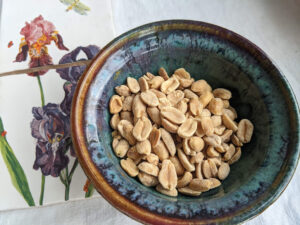
Peanuts are a bean! Jicama are bean roots! So is liquorice. Out of the three, liquorice is the only one I am not (yet) planning on growing this year.
I am very excited about the idea of trialing out peanuts at Firefly Field. I have not heard of anyone growing peanuts in Vermont. I haven’t even heard anyone mention it. This is probably because we think of peanuts growing in southern states with hot and humid weather. But, with a little research, I quickly discovered that they are successfully being grown on farms in Michigan and Idaho so there is no reason why they shouldn’t be able to be grown in Vermont.
“Treated seed exposed on soil surface may be hazardous to birds. Cover or incorporate spilled treated seeds.” This is written under the heading of Environmental Hazards on Rancona, a fungicide commonly used on peanut seeds.
After seeing the “sold out” on peanut seeds on many sites, I figured I would buy some non-organic peanut seeds and see if I could sort it out afterward. I hoped for the best because the company I bought the seed from had a lot of other organic seeds and had “GMO free, USDA organic, and NO neonics” plastered all over their homepage. It is possible to use non-organic seed for organic crops if a farm is unable to find a suitable source for organic seed and as long as the seed is not treated with prohibited substances. I regularly use six to seven seed companies already but none of them carry peanut seeds.
After receiving the peanut seeds in the mail and seeing the “(treated)” labeling, I contacted the seed company to see what it is treated with so that I could communicate with my organic certifier about what I may be using. The seed company wrote back saying they are treated with “Ipconazole, Carboxin, and Metalaxyl” which didn’t mean anything to me. A quick internet search took me to the EPA label for Rancona which has those three ingredients and states that it is commonly used as a fungicide for peanut seed. But it also stated that treated seed must be labeled as treated with Rancona, which is not on the seed package that I have.
I talked to a material specialist and inspector for VOF, my organic certifying body, about what I had found out so far. They said that they would contact the seed company to try to confirm how the seed was treated but they thought that I most likely would not be able to use the seed because that kind of fungicide is not allowed for organic production and can persist in the soils, taking the whole field out of organic production. In the meantime, I continued to reach out to organizations and companies looking for organic seed, or at least peanut seeds that has not been treated.
The material specialist heard back from the seed company saying that the label that they had was destroyed in shipping and so they do not know what the seed is treated with but they did give us the name of the peanut company they purchased the seed from so we could reach out to them. That company doesn’t have a listed email but I did give them a call. So far I haven’t heard back. I have also not heard back from the few other peanut seed companies who grow untreated peanut seed.
So, the search continues! If anything, the difficulty in finding peanut seed that can be used on certified organic farms makes me even more determined to grow peanuts. Besides, the thought of growing and roasting my own delicious peanuts sounds amazing!